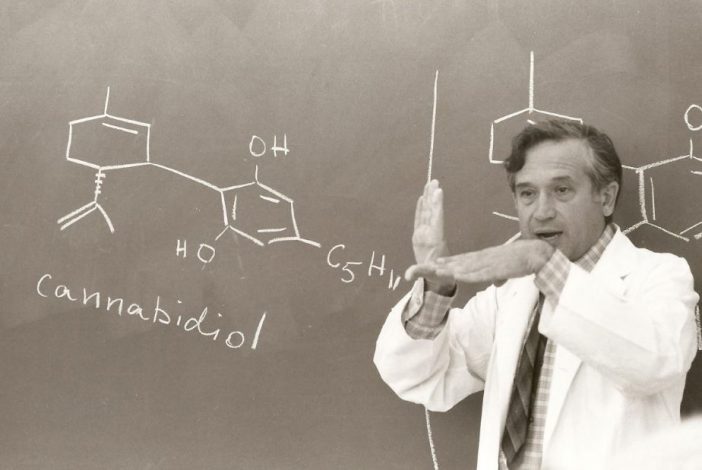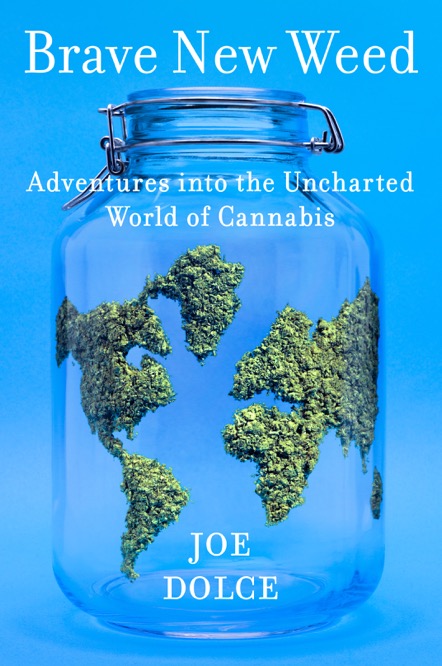The following is excerpted from Brave New Weed: Adventures into the Uncharted World of Cannabis by Joe Dolce, published by Harper Wave.
If you are under the misapprehension that science occurs in gleaming white labs with sleek, modern equipment, let me assure you that Dr. Raphael Mechoulam’s beige world hasn’t seen a decorator, let alone a paint job, in forty years. My conversation with the father of cannabinoid research was sporadically drowned out by electricians tearing out the ceiling in the hallway to replace decades-old wiring. I had expected more distinguished surroundings for such a highly decorated researcher, but science is a painstaking affair, not a showy one, and scarce pennies are rarely spent on shiny surrounds. Most scientists would probably be suspicious of showy digs anyway.
Once the banging subsides I kick off our conversation by explaining my journey through the new world of cannabis. “Yes, it is a new world,” he says. “Four or five thousand years. Not too old.” Gentle admonition noted.
“But for a plant that’s been around so long we seem to know so little about it.”
“We know quite a bit about it,” he counters. “It was used in the black populations and by jazz musicians who said that they couldn’t play their jazz unless they were under the effect of cannabis, which probably has some truth. What we don’t know, what no one has looked into, is whether it causes any change in the emotions that make it better for musicians.”
At the time that statement washed over me. Only when later reviewing my tapes did it became clear that he was talking about the potential power of endocannabinoids to affect the emotional center from which artistic expression arises. Instead, I moved on to the less savory topic of my own vomiting and asked: If cannabis is so effective in treating nausea, why can it sometimes trigger the opposite reaction?
It has a lot to do with dose, he explains. A large amount can cause an entirely different response than a small one, “and it is probably individually determined.” Everyone has a different susceptibility, probably because our endocannabinoid systems vary. “The first and only time we gave it to people about fifty years ago, my wife made a cake and put ten milligrams of THC in each piece of cake. Five of our guests took the cake with THC and five took the placebo. The placebo had no effect, but all of those who took THC reacted differently. My wife felt a little bit high. She sat in her chair. Another said he felt nothing but every fifteen seconds he started talking, pa pa pa. Another didn’t stop talking for two hours—he was a member of Parliament so it accentuated what he knows—and the fifth one had an anxiety reaction. So same dose, five different reactions.”
Every few months, it seems, new reports come out associating overuse with schizophrenia. Is this fact or is this propaganda?
It depends on what part of cannabis you’re talking about, Mechoulam responded. “We gave CBD to a schizophrenic girl in Brazil who displayed no psychotic symptoms as long as she got CBD orally. We couldn’t do clinical trials—it takes a lot of money. In 2012, a German group reported that CBD is an extremely good antischizophrenic compound, as good as the drugs being administered today, with one exception: the potent antipsychotics given today cause nasty side effects and CBD does not. In large doses they found that CBD enhances anandamide concentrations in the brain. There are a lot of things anandamide does, all of them essentially positive.”15
As he’s speaking, Mechoulam prints out a chart that lists the dizzying number of illnesses in which the ECS system is somehow involved. In addition to the obvious suspects, the list includes stroke, morphine dependency, Parkinson’s disease, Huntington’s disease, neurodegenerative disorders, epilepsy, cancer, diabetes, osteoporosis, inflammatory bowel disease, psoriasis, arthritis, and seizure disorders. It also includes so-called untreatable illnesses such as chronic hiccups, a torturous affliction that can persist for months, and Tourette’s syndrome, a neurological disorder characterized by repetitive, involuntary movements and weird vocal tics.
My face must indicate incredulity because Mechoulam interrupts himself to ask, “You don’t believe me?
“George Kunos, one of the heads of the National Institutes of Health in Washington, recently wrote that the endocannabinoid system is apparently involved in almost all major diseases of the body.16 This is a very strong statement because Kunos is an excellent scientist—Hungarian, you know—and because there are very few compounds that act on everything.”*
What I’m thinking is, Pharmaceutical companies are tripping over themselves to find new drugs that heal without killing people. But what I say is, “If anandamide or other cannabinoids do all of these marvelous things, why haven’t you patented a synthetic version?”
“We did. But by the time we got people interested the patent was ten years old, and then it was too late. A patent is only good for twenty years, and by the time a pharmaceutical company completes trials they’ll have just a few years left to make back their investment. And so, there we are.”
If I were Mechoulam, I’d probably feel like a lone man screaming in a forest whom no one hears. Isn’t he frustrated, I ask, by the political and legal hurdles that have caused his field to progress so slowly?
His warm, questioning eyes greet me with a gaze as if to say, you poor, naive layman. “Why should I be frustrated? It depends on where you start. I’m a pessimist. I didn’t expect anything to happen. The first prize I got was for best publication by a young scientist at the Weizmann Institute in the 1960s. A committee made that decision, but the chairman of the academic board thought I should be doing something else and did everything to kick me out.”
I don’t believe he’s a pessimist. Mechoulam’s investigations and insights have blazed this trail for the last half century. Pessimism doesn’t fuel such single-focused dedication. Curiosity does.
“Our brains produce two hundred to three hundred anandamide-like compounds, most of which no one has looked at. When you sit around with your friends, are you a photocopy of any of them? If I see my granddaughter running toward me, I feel happy. Why is that?” What he is asking is: Could cannabis be the chemical link that translates the objective reality of the child rushing toward him into the subjective feeling of happiness?
And then he reveals his big theory: “Why the hell is the body making this many compounds at the same time? Why doesn’t it make just five compounds? We have two to three hundred anandamide-like compounds in our brain, and their levels and ratios are different. Is it just possible that the interplay of these compounds causes the differences in our personalities or has something to do with our psychological setup? We know almost nothing about the chemistry of our personalities. Our body produces compounds that regulate every physiological system, so why not our personalities? People discovered the major neurotransmitters in the 1930s and ’40s, but here’s a new system, and we should expect new things to be discovered.”
Of course, this is simply a theory, but it’s as riveting as it is in- conceivable that something in this much-maligned plant could actually hold the key to unlocking the brain chemistry of emotions.
According to Dr. Ethan Russo, it’s generally wise to heed Mechoulam’s hunches. “A great scientist doesn’t just figure out the how, but the why, and Mechoulam excels at this. To outsiders it may seem that these three hundred chemicals he’s discussing are extraneous, but one of his guiding principles is that nature doesn’t waste energy. There must always be a rationale behind the energy the body expends to make these things, and his passion has been to uncover that rationale.”
Or, in the words of this self-identified pessimist, “The anandamide story may continue well beyond what we know today. Why are we sorry? Angry? Happy? I don’t know, but one has to prove a theory. It’s not a big deal. For the next fifty years I need something to do.”
***
Celebrate the release of Joe Dolce’s Brave New Weed with a conversation between Joe Dolce and journalist Michael Zaytsev about their adventures in the cannabis world at The Alchemist’s Kitchen in NYC, October 4. A Bowery Cannabis Club event moderated by Lex Pelger. Learn more here.
















